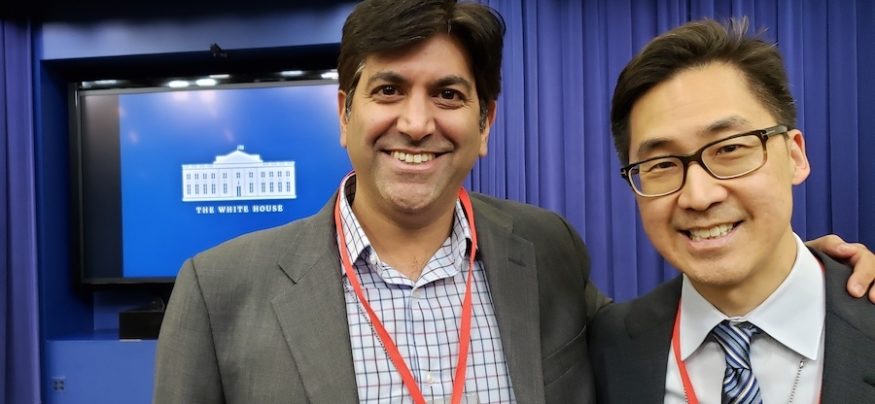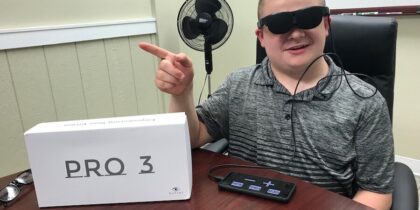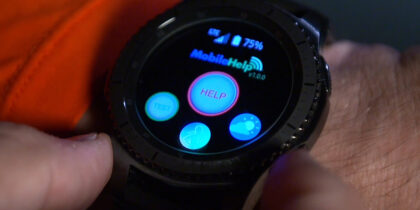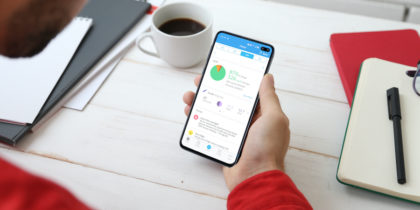[Above: Aneesh Chopra, left, author of “Innovative State” and the former chief technology officer of the United States, is pictured with Dr. David Rhew, chief medical officer and vice president of B2B Healthcare for Samsung Electronics America, at the White House Executive Forum on Healthcare Data Interoperability]
Last week, Samsung was honored to participate in the White House Executive Forum on Healthcare Data Interoperability, where the U.S. Department of Veterans Affairs launched its first Health Application Programming Interface (API) that will enable veterans to interact with their own personal health data while mobile. We are proud to be collaborating with U.S. government officials and other public and private partners to advance this Open API Initiative.
The Open API Initiative, which is used by healthcare providers to access and exchange patient information, reconsiders what it means to put the patient truly at the center of care. For years, healthcare providers and their information technology partners have struggled with several thorny data issues:
- Ensuring patients have complete access to their medical records or files
- Providing seamless movement from provider-to-provider without restarting parts of the healthcare journey with each new provider
- Meeting their patients’ need to feel fully informed and empowered to make the right decisions
Fortunately, when Congress passed the 21st Century Cures Act in 2016, the legislation included an important provision regarding patient access to their medical records, portability of the patient data and interoperability of the health data. The law requires that certified health information technology products have an API that allows health information to be accessed, exchanged and used “without special effort” and provides “access to all data elements of a patient’s electronic health record to the extent permissible under applicable privacy laws.”
How Mobile Solutions Improve Patient Experience
Get your free guide to enhancing the patient experience with mobile technology. Download Now
Since then, the Office of the National Coordinator of Health IT (ONC), Centers for Medicare and Medicaid Services (CMS), Veterans Affairs (VA) and other public and private stakeholders have made significant progress to further define open API specifications. During the CMS Blue Button 2.0 Developer Conference in August 2018, leading cloud providers made a commitment to remove barriers in the way of adopting technologies for healthcare interoperability — and in doing so unlock the potential of healthcare data to improve lives.
The Open API Pledge started from several foundational assumptions, released in a joint statement by Amazon, Google, IBM, Microsoft, Oracle and Salesforce:
- The frictionless exchange of healthcare data, with appropriate permissions and controls, will lead to better patient care, higher user satisfaction, and lower costs across the entire health ecosystem.
- Healthcare data interoperability, to be successful, must account for the needs of all global stakeholders, empowering patients, healthcare providers, payers, app developers, device and pharmaceuticals manufacturers, employers, researchers, citizen scientists, and many others who will develop, test, refine, and scale the deployment of new tools and services.
- Open standards, open specifications, and open source tools are essential to facilitate frictionless data exchange. This requires a variety of technical strategies and ongoing collaboration for the industry to converge and embrace emerging standards for healthcare data interoperability, such as HL7 FHIR and the Argonaut Project.
- We understand that achieving frictionless health data exchange is an ongoing process, and we commit to actively engaging among open source and open standards communities for the development of healthcare standards, and conformity assessment to foster agility to account for the accelerated pace of innovation.
Through this initiative, our goal is to make patient health data stored in hospital and clinic electronic health records (EHRs) accessible, portable and transferable. We also hope this new system will provide access to payer-managed claims files and other population-based patient data that are inaccessible and uninterpretable to most patients and even some providers.
As a company that champions innovation through openness and collaboration, Samsung is eager to leverage our technology and forge partnerships that will enable patients and consumers to gain meaningful insight into their health data through a variety of open and secure platforms. Consequently, Samsung is proud to join major cloud providers in embracing the Open API Pledge. Through this effort, we will advance the broader cause of empowering patients and consumers to better manage their care, which will ultimately lead to improved health outcomes and lower costs.
Learn how Samsung mobile solutions are facilitating care and improving patient lives.








